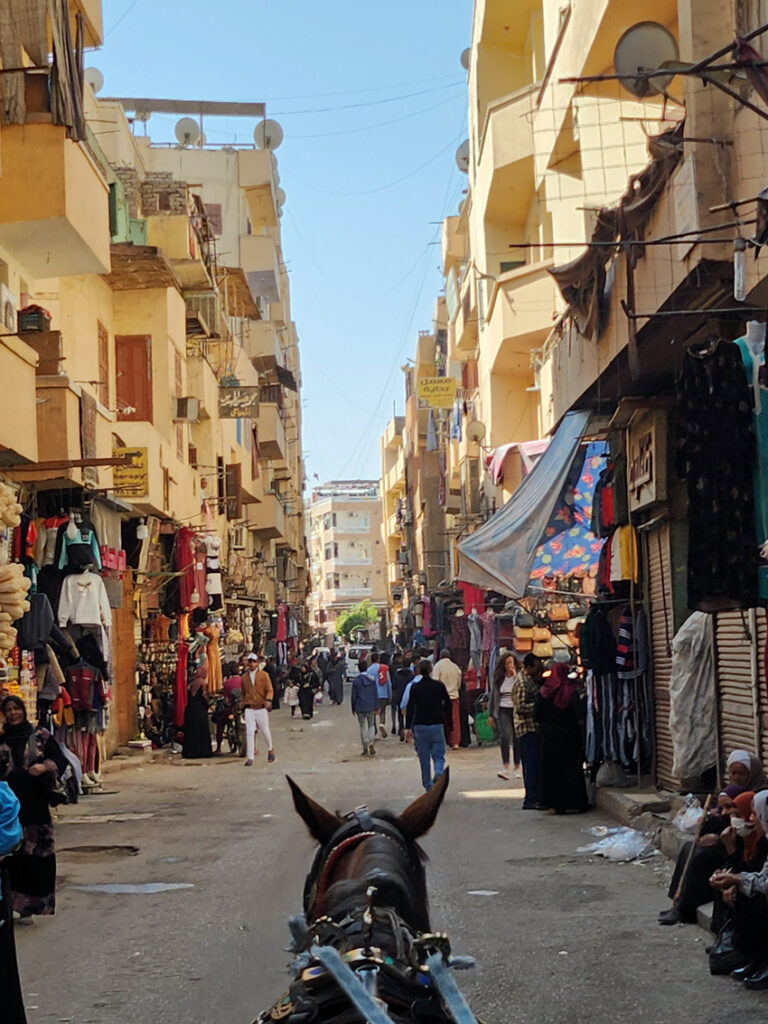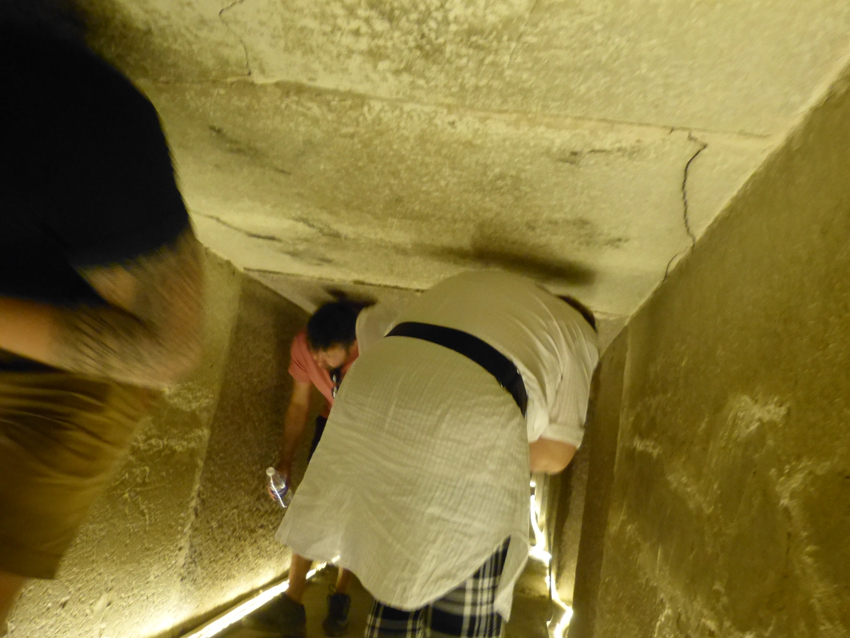Last Updated on March 28, 2023 by PowersToTravel
I’ve traveled in SE Asia, South America, Europe and Africa. I considered myself to be an old hand at managing diabetic concerns in foreign countries. I’ve thrown up in Costa Rica, Peru, Morocco, Cambodia, and even New York City!
Egypt really surprised me. The great news is that we traveled for more than two weeks in Cairo, Luxor, Aswan and Abu Simbel and I had no issues or digestive episodes. Egypt is known for its Pharoah’s Revenge, and it seems as if every blog I read before the trip talked about the writer’s encounter with it.

Since Egypt was for me a Bucket List Event, I was determined not to fall prey to the Pharoah’s Revenge. I cannot say I came completely unprepared for Egypt, after all, I had followed my “Diabetic Travel Tips for International Travel” to a “T”. I’d gotten the right vaccines, brought the right medications, packed our bags with Koolaid and granola bars. We had even hired tour guides throughout the trip, to educate us better and ease our transportation concerns.
The bad news is that we failed to enjoy the food
If you are looking to lose weight, come to Egypt and be a diabetic. How many dinners did I skip, and eat a granola bar instead? Quite a number. Where did I get these granola bars? We brought them in our luggage because we never saw a grocery store on our trip. We never saw American/European packaged food products.
Don’t think you will find grocery or convenience stores throughout Egypt. Egypt is surprisingly an un-Western-oriented country. For convenience and access to Western products, I’d rank it with Cambodia. Surprising that was. We stayed in Giza, Zamalek in Cairo, the West Bank and the East Bank in Luxor, Aswan in city center, and Abu Simbel.
Giza is a very dirty place and I wouldn’t have wanted to go into a store there if we had even looked for one. We found a tiny grocery in Zamalek where we bought the single brand of laundry detergent they carried. Not a single grocery on the West Bank in Luxor, and while the East Bank has the city, I didn’t see a grocery, just vegetable or meat stands in markets. And well, Abu Simbel basically is made of hotels.
I sure was glad we brought our granola bars. But, why did we need them?
The eating patterns of the Egyptians don’t match the eating patterns of the average tourist
We needed a lunch mid-day to keep us going. Not a cup of coffee. We needed a dinner at dinnertime. The tour guides seemed surprised that we insisted on stopping our tour to eat around 1pm. In the event that we had a special tour event near dinnertime, such as the awesome Al Tannoura Dance Show, they seemed to be uncaring whether or how we we would eat. Were the typical non-touring Egyptians eating at 10pm like the Spanish? I really don’t know and actually didn’t care because I had to eat! I just didn’t expect it to be such a struggle. Bottom line here, you must plan your dinner into your day, not hope that somehow the guides have it covered for time / location. And not expect that they will care. “I do need to get something to eat.” They look at you as if you have violated some international travel rule.
Sometimes the tour guide would try to take us to a Tourist Buffet, at the price of about $25 per person. These buffets cater to the bus-loads of tourists. This was unacceptable to us on two counts: first, I don’t eat at tourist buffets – the food is often poor and not recently prepared. The bottom line in trying to stave off Pharoah’s Revenge is that the food be freshly prepared and fully cooked.
The second reason is my husband – he felt that the tourist restaurants were a rip-off, where the guide gets a commission for having the tourist delivered to be fleeced. While we must stop to eat mid-day, we can’t possibly eat a dinner, or food valuing that much money, at 1pm. The food certainly was not worth the money, and the guides were certainly insistent on bringing us there!
Somehow, the adequate communication skills of the tour guides would fail them when we wanted to eat. Somehow the guide would not understand us, what we wanted to eat and why what he was selling us was unacceptable. It made for a lot of frustration as I knew that I couldn’t compromise and expect to remain healthy for the trip.
We tried warning the guides about our lunch needs early in the day, at tour pickup. They would sort of shrug and forget it.
We learned to say “Shawarma”, emphatically. Shawarma is a Turkish food found throughout the middle east. It’s freshly BBQ’d beef, or lamb, even chicken, thinly sliced, put in a wrap, with sauce and vegetables. Now I would say “NO VEGETABLES!” not because I won’t eat them but because I was afraid that they might be less fully cooked than they should be. Bread and Meat, fully, freshly cooked, is what I lived on in Egypt. And that is Shawarma.
I feel it may have been an insult to be traveling throughout Egypt asking for Turkish food. At least I wasn’t asking for McDonald’s!
The average tour guide does not care about the well-being or happiness of his clients
It is so sad for me that write this post, as we have had such excellent tour guides throughout the world. A number of them continue to be our Facebook friends, and I think of them very fondly.
However, that won’t be the case for Egypt. The average tour guide in Egypt does not care about the well-being or happiness of his clients. We dealt with a single reputable tour company who engaged multiple guides in multiple cities. What almost all the guides had in common was the desire to up-sell us into more tours or get us into shops or restaurants where they would earn a commission. Somehow I thought that by going to a single company with a single tour mission, even if they gave us a different guide in each city, the company would see us clients to be pleased, not sheep to be fleeced. Not so.
Best Diabetic Travel Tips
This translates into Diabetic Travel Tips of “be insistent” and “don’t worry about not fitting in.” Be insistent you won’t eat at a buffet. Be insistent you need to eat. Don’t feel guilty if you are not “enjoying the local culture” by eating it. Choose to eat at the “Mr. Chick” (very excellent fried chicken joint in Zamalek) to ensure fully cooked food. Splurge and eat at the Steigenberger Thai Restaurant in Luxor, (splurge = $34 for dinner for two at a elegant riverside venue in an upscale hotel!) or have pizza at the CityMax mini-mall in Aswan.
Think, in Egypt, that “eating healthy” is not eating fresh vegetables, low fat options, but rather, FRESHLY, FULLY COOKED food, no matter the nationality.
Protect your insulin from the Heat – focus on the Cold
This diabetic travel tip applies to all countries, all seasons, everywhere.
However, it had a new twist for me this trip because I tried a new product I’d purchased: the Frio insulin cooling case. (I am in no way related to the company, other than being a happy customer!)
In previous trips I had carried more luggage, and in that luggage a cardboard box complete with foam inserts and freezer bars. (See my post “How to Keep Insulin Cold for 28 Days and more than 24 hours“). But this time, because we did not expect heat to be a problem in Egypt, as we were traveling in November, and luggage space in the small cars in the middle east was expected to be minimal, and the trip was relatively short, I went with the Frio.
It worked marvelously, with one gotcha, that is, the need for cold water. To top off the Frio one needs cold water. Here in the US, it’s pretty reasonable to expect the cold tap to spurt cold water, at least in my experience in the Northeast. However in Egypt, tap water is lukewarm. Lukewarm water equals lukewarm temperatures in the Frio. So, I would look for an ice machine. However in Egypt, in 3-star hotels, you won’t find an ice machine. Ice in a restaurant? Hardly.
Luckily I learned about this issue on a day when I could actually just put the Frio into the hotel room frig for the day. I learned to put my own water bottle into the frig overnight, and by morning I would have a nice bottle of cold water with which to douse my Frio pack.
I always make reservations in hotels with mini-bars/room refrigerators. Sometimes that means upgrading the room quality, or choosing a more expensive hotel. Using the Frio, I have come to realize the vital importance of the refrigerator as a source for cold water. Sure I could alternate days of hotels with mini-bars with hotels without, since you don’t need to top off the Frio every day, but I certainly don’t want to add that extra coordination to my already stretched tourist plans. I wouldn’t want to find myself in a room needing cold water that night and not have a frig.
The motto for the remainder of the trip became “Focus on the Cold, ” even though the weather was not terribly hot!
Another unusual Travel Tip – Don’t Hit Your Head!
Well, you didn’t expect this tip, did you? I have high myopia in both eyes; it’s not a diabetic problem, just a problem affecting many people. We need the “coke bottle” style glasses. Our eyes are more football shaped than round.
One major risk with high myopia is detachment of the retina, which if not immediately treated easily ends in blindness. I know about this because the detachment happened to me. My retina detached in one eye about a year after cataract surgery (I hadn’t been aware of how much high myopia raises risks to your eye for detachment following cataract surgery!) Anyway, that’s a long story and to make it worse, is a vacation/travel story. I haven’t written it yet even though it happened two years ago.
But all my adult life, way before the detachment of my retina, my eye doctors would warn, “Avoid trauma to the head!” “You need to see me immediately to save your sight.”
Luckily, on this trip to Egypt nothing bad happened! But the average tourist gets into a lot of tight and short spaces in Egypt. Climbing, half bent over, we staggered through hot tunnels in the pyramids and in the tombs in the Valley of the Kings.

I walked slowly, often with my hand on the top of my head, anything to make sure I didn’t crack it against the uneven rock surfaces. The voice of Dr. Gendelman, like the ghost of the pharoah whose tomb we invaded, whispered in my ear, “Avoid trauma to the head.”
Vaccines before you go
Several months prior to our trip, I checked out the CDC’s Egypt page. For us, it was necessary that we get a Typhoid vaccine.
You just never know what you’ll get into, when you embark on International Travel. One might think that, “Hey, we’ll just be in cities, doing the average tourist thing.” But surprisingly, on this trip, on our dahabiya cruise on the Nile, they stopped the boat, in the countryside, along a sandy bank, and offered the opportunity to go swimming in the Nile. Swimming in the Nile! You’ve got to be kidding! Where do you think the sewage from the little villages empties into? Not to mention the water buffaloes and farms along the way!
There were some people on the boat who felt that swimming in the Nile would be a great bucket list experience; on went their bathing suits and they waded out into the river. What was hysterical was how cold the river was in November. They were freezing! I just watched from the bank, taking pictures, not participating.

I might have dipped my toe into the Nile, but sadly I had stubbed my toe the day before and had an open cut on my toe. You think I’m going to put an open wound into questionable water?
Many people just effervescently barge ahead and enjoy the ride, but as a diabetic there are lines I don’t cross, and risk of infection is one of them. I was surprised my husband followed my lead. “You have no idea what might be in that water,” he said.
All this to say that you don’t actually know whether you will find yourself in a questionable circumstance in travel; I paid attention to the CDC’s warnings and we got our Typhoid vaccine, and we’re now good for two years.





